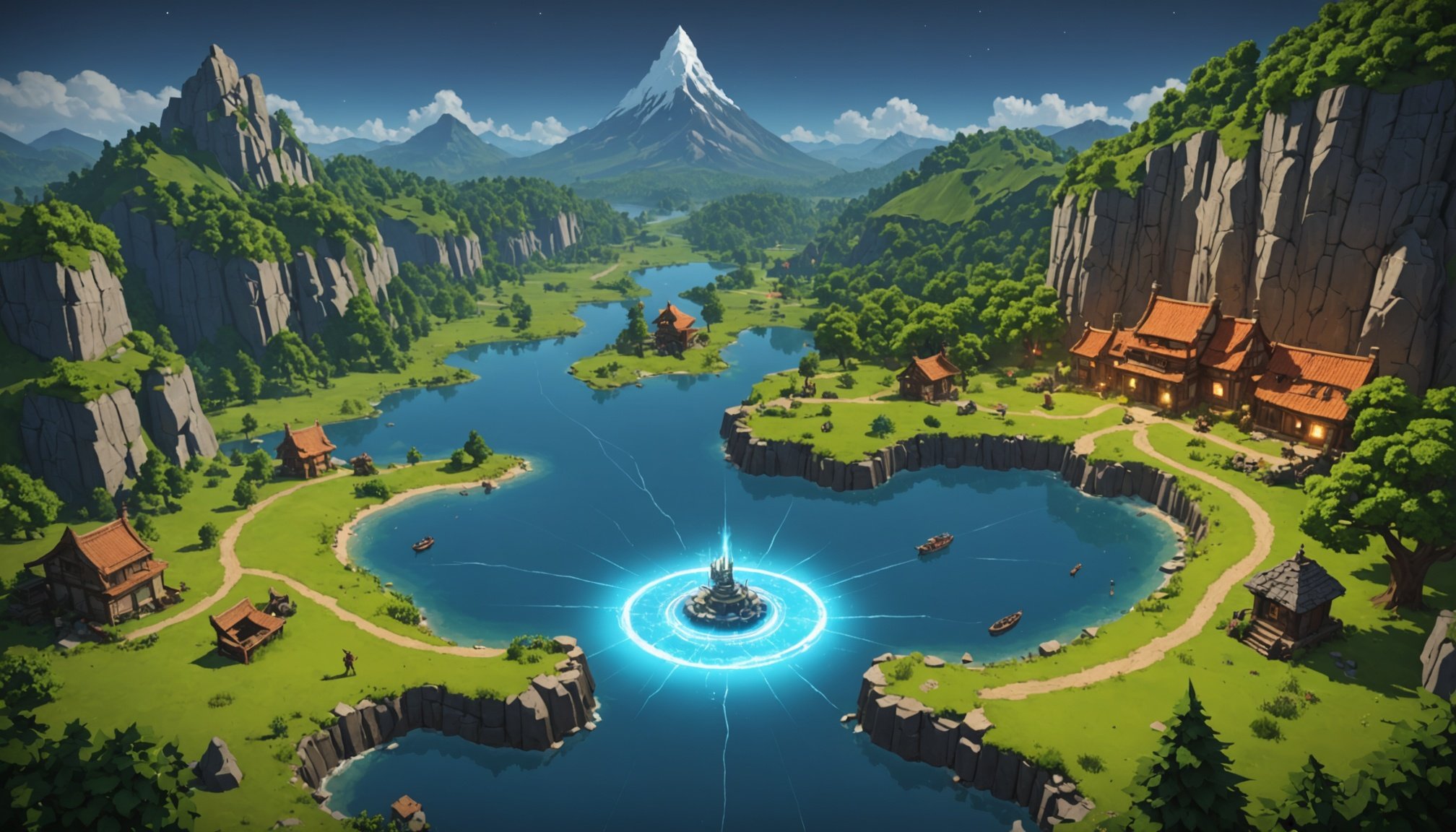Unleash Endless Journeys: Transforming RPG Adventures Through AI-Powered Procedural Generation
In the realm of tabletop role-playing games (RPGs), the art of storytelling and world-building has always been a labor of love, requiring hours of meticulous planning and creativity. However, with the advent of artificial intelligence (AI) and procedural generation, game masters and players alike are now empowered to create immersive, dynamic, and endlessly varied adventures with unprecedented ease.
Revolutionizing Campaign Design with AI
AI is not just a tool; it’s a co-creator in the world of RPGs. Platforms like LitRPG Adventures Workshop are at the forefront of this revolution, offering a suite of AI-powered tools that streamline campaign design and enhance the overall gaming experience.
NPC Creation and Monster Generation
AI can generate diverse characters with rich backgrounds and motivations, as well as new creatures with distinct abilities and behaviors. For instance, LitRPG Adventures allows you to create NPCs with detailed histories, personalities, and even dialogue scripts, making interactions feel more realistic and engaging[1].
Quest Building and Item Balancing
AI-generated prompts can help design intriguing missions and tailor magical artifacts to align with the game’s dynamics. This ensures that quests are challenging yet balanced, and items are meaningful and impactful within the game world[1].
Additional reading : Mastering the Game: Essential Strategies for Seamless Transitions Between VR and Classic Gaming Modes
Setting Design and Conflict Resolution
AI assists in developing richly detailed worlds, from bustling cities to remote wilderness areas. It also helps in planning multi-faceted conflicts with various possible outcomes, keeping the game exciting and unpredictable[1].
Dynamic World Generation in AI Games
Procedural generation, enhanced by AI, is transforming the way game worlds are created. This technique uses algorithms to generate content dynamically, ensuring that each playthrough is unique.
Procedural Generation Techniques
Techniques like noise functions (e.g., Perlin noise) create natural-looking terrains, while L-systems simulate plant growth, and cellular automata model complex systems like weather patterns or population dynamics[3].
| Technique | Description | Example |
|---|---|---|
| Noise Functions | Algorithms to generate natural-looking terrains | Perlin noise for mountains, valleys, and plains |
| L-systems | Simulate plant growth | Diverse flora in game worlds |
| Cellular Automata | Model complex systems | Weather patterns or population dynamics |
AI Game World Generators
These generators analyze player behavior and preferences to tailor the game environment. For example, if a player frequently explores forests, the generator might create more forested areas or quests related to that environment[3].
Enhancing Creativity and Efficiency with AI Tools
AI tools are not just about automation; they are designed to enhance creativity and streamline the game development process.
AI-Driven Content Creation
Tools like LitRPG Adventures and hex worldbuilders combine procedural generation with generative AI to create dynamic, interconnected worlds. These tools offer templates and frameworks that help in constructing dungeons, designing puzzles, and crafting magic items[2].
Time Efficiency and Consistent Quality
AI tools save hours of creative energy by providing quick prototyping and ready-to-go templates. They also ensure consistent quality through error checks and balanced puzzles, making the game fair and engaging for players[2].
Benefits of AI in RPG Campaigns
The integration of AI in RPG campaigns offers several benefits that enhance both the game master’s experience and the players’.
Increased Replayability
AI-generated content ensures that each campaign is unique, preventing monotony and encouraging players to return for new experiences. This is particularly evident in dynamic level generation, where AI adjusts the difficulty and content based on player skills and preferences[4].
Personalized Experiences
AI can adapt levels and storylines based on individual player actions and choices, making the game more accessible and enjoyable. For instance, AI can generate puzzles tied to the campaign lore, increasing engagement and narrative consistency[2].
Efficient Development
Developers can save time and resources by automating level design and content generation. This allows them to focus on high-level creative decisions and other aspects of game development[4].
Practical Insights and Actionable Advice
For game masters and players looking to leverage AI in their RPG adventures, here are some practical insights and actionable advice:
Using AI for Spur-of-the-Moment Content
AI tools can quickly generate necessary encounters or settings on the fly, preserving session momentum. This is especially useful for spontaneous moments in the game where you need to adapt quickly to player actions[1].
Integrating AI into Your Campaign
Start by using AI to generate NPCs, quests, or even entire storylines. Tools like ChatGPT can help brainstorm and refine puzzle ideas, while MidJourney/DALL-E can generate images for dungeon settings and artifacts[2].
Balancing Encounters
Use AI to adjust challenges to match player capabilities. This ensures that the game remains engaging without being overwhelming. For example, AI can determine optimal enemy placements and resource distribution based on player behavior[4].
Real-World Examples and Anecdotes
LitRPG Adventures Workshop
Paul Bellow’s LitRPG Adventures Workshop is a prime example of how AI can transform RPG campaigns. By providing a suite of AI-powered tools, this platform makes it easier for game masters to create vibrant worlds, intricate plots, and complex characters effortlessly[1].
Elon Musk’s xAI Venture
Elon Musk’s xAI venture is another significant example of AI’s potential in game development. By leveraging AI technologies like Grok and ChatGPT, xAI aims to create unique gaming experiences that are both personalized and immersive[5].
The Future of RPGs with AI
As AI continues to evolve, its impact on RPGs will only grow. Here’s what the future might hold:
More Immersive and Responsive Game Worlds
AI will continue to enhance game mechanics, character behaviors, and environmental interactions, leading to more lifelike virtual worlds. AI-driven narrative development will create immersive, personalized experiences that adapt to player choices[3].
Streamlined Development Processes
AI will streamline development processes by automating repetitive tasks, allowing game developers to focus on creative decisions. This could reduce production times and costs, making game development more efficient[5].
AI-powered procedural generation is not just a tool; it’s a revolution in the world of RPGs. By leveraging these technologies, game masters and players can create endless, unique, and engaging adventures that were previously unimaginable. Whether you’re a seasoned game master or just starting out, AI is here to make your RPG journeys more exciting, efficient, and unforgettable.
As Paul Bellow from LitRPG Adventures Workshop puts it, “AI brings this dream to life, enabling you to focus on fine-tuning your narrative and spending more time playing rather than prepping.” With AI by your side, the possibilities are endless, and the magic of RPGs is just a click away.
















